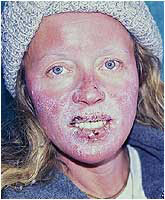 |
 
Left: Tina´s
frostniped face. Right: Iranian medicine. |
Medicine on
Everest is simply a game of helping each other when needed, for you never know when it´s
your turn be struck ill. That may mean being handed some strange Persian pills from the
friendly Iran-expedition doctor, murmuring Allahuakbar, and swallowing with your fingers
crossed. And later giving out what's left of your supplies to a brave Nepali nurse,
running her small, lonely medical station somewhere on the Rhodoredron clad foothill of
the mountains. Text: Tina Sjögren, Photo: Thomas and Tina Sjögren
Everest is harsh on us. The dry air, the extreme variations in
temperature, the oxygen deficiency, the technical parts of climbing and other
circumstances all take their toll on you. Edema makes your face swell up like a balloon. A
far worse edema can affect your lungs or brain. Frostbite and frostnip can strike your
face, hands and feet. As a woman you might want to consider the consequences of an
Alpine-climb-adventure. It better be worth it for you, for the skin on your face might
never look as a soft as a baby's again  |
 |
Click on image to view large: Tina and Iranian climbing doctor. |
 |
Click on image to view large: Tina´s facial edema. |
 |
Click on image to view large: Tina´s sore hand, Icefall. |
 | Altitude is hard on the
stomach too and since human and yak extremities don´t fade in this climate, just
a tiny, invisible peace of this stuff in your drinking water may rapidly transfer you from
the mountain to a hospital.
We bring a whole range of medical aids to cope with our endeavours.
But the best thing to do is to take it slow whilst acclimatizing and -
DRINK PLENTY. This is the best way to feel healthy on the mountain. We force down as much
as 8 liters a day. Another good tip is to wear some kind of mask as protection against the
cold, dry air. We wear masks made of steel wire threads that were invented for the Finnish
Olympic ski team.
To climb a high mountain means that you need to know what happens in your
body at high altitude. Brain and lung edema is deadly and you might not even notice that
you suffer from it. You might fall a sleep with a slight headache only to never wake again
in the morning. Hypothermia could set in in a sudden storm and kill you in half an hour.
Frostbite doesn't show untill it's a fact. There are ways to prevent, cure and survive.
But it requires that you study mountaneering medicine and climb smaller mountains
gradually - preferably selfsufficiently (i.e. without guides) - to learn the name of the
game. Only then will you be a dependable partner and be able to survive when the going
gets tough.
|